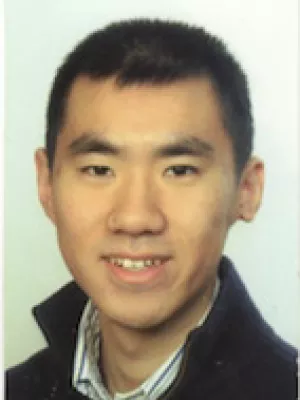Biography
Dr. Wang joined the Transplant and Stemcell Immunobiology Lab initially in 2012 as a doctoral student and in 2016 as a postdoctoral fellow. His focus is mainly in cardiovascular and translational medicine. Prior to UCSF, Dr. Wang has earned his medical degree from the University of Hamburg, Germany. His doctoral thesis from the University of Hamburg in 2015 investigated new molecular targets and mechanisms to inhibit the development of myointimal hyperplasia and was graded with summa cum laude.
Dr. Wang's primary clinical interest is contemporary interventional methods for treating coronary artery disease and valvular heart disease. He is dedicated to the early detection of heart diseases and investigation of new therapeutic mechanism. He focuses on integrating the most recent laboratory advances into clinical paradigm.
Education
University Hamburg, Hamburg, M.D. Medicine, 2009-2015
University of California San Francisco, San Francisco, Postdoctoral Fellow, 2016
Clinical Interests
Early Detection of Heart Diseases
Valvular Heart Disease
Coronary Artery Disease
Presentation at the International Society for Heart and Lung Transplantation (ISHLT) Meeting 2015, Topic: Transplant vasculopathy: Local microRNA modulation is feasible, Philip K. Caves Award Finalist
Presentation at the American Heart Association (AHA) Scientific Meeting 2014, Topic: Local microRNA modulation is feasible: A novel anti-miR-21-eluting stent prevents in-stent restenosis, Vivien Thomas Award Finalist
Presentation at the 1st UKE (University Medical Center Hamburg-Eppendorf) Light Microscopy Symposium 2013. Topic: JAK1/3-Inhibition (R507) diminishes acute and chronic rejection while demonstrating immune cell specifity.
Presentation at the CVRC (Cardiovascular Research Center Hamburg) Seminar October 2013, Topic: Micro RNAs - Role and Potential in Vascular Diseases
Poster prize at the “Cardiac Regeneration and Vascular Biology Conference 2013” in San Servolo (Venice), Topic: Translational research: A humanized model to study the development of restenosis after stenting
In the News
Research Narrative
Dr.Wang is dedicated to increase the understanding of genetic and molecular pathways in vascular smooth muscle cells, which underlies the evolution of myointima hyperplasia and in-stent restenosis. Myontimal hyperplasia is a pathological process after vessel injury and characterized by abnormal proliferation of smooth muscle cells and subsequent luminal obliteration. The overall goal is to identify potential targets to prevent disease development and increase the success of treatments for coronary heart disease.
In addition, Dr. Wang has special interest in stem cell based regenerative medicine. He aims to understand the immunological barriers that currently impede the successful application of cell-based regenerative therapy.
Research Interests
Cellular and molecular pathways during myointima formation
Regulation and characteristics of vascular smooth muscle cells
Pluripotent stem cell immunobiology

